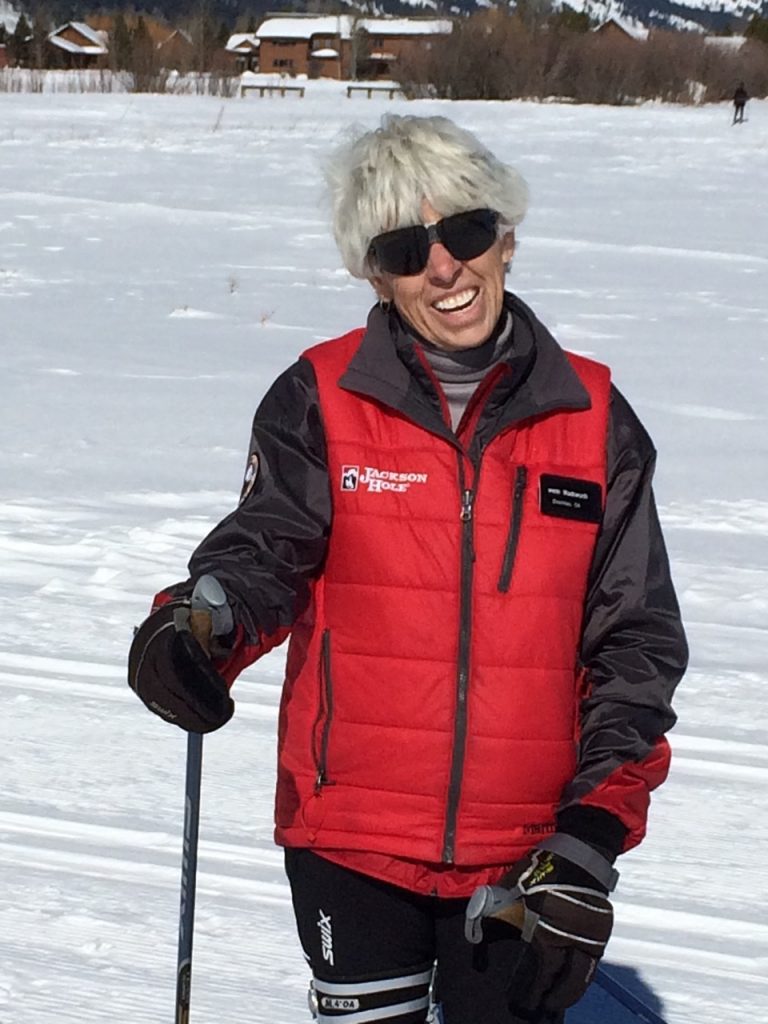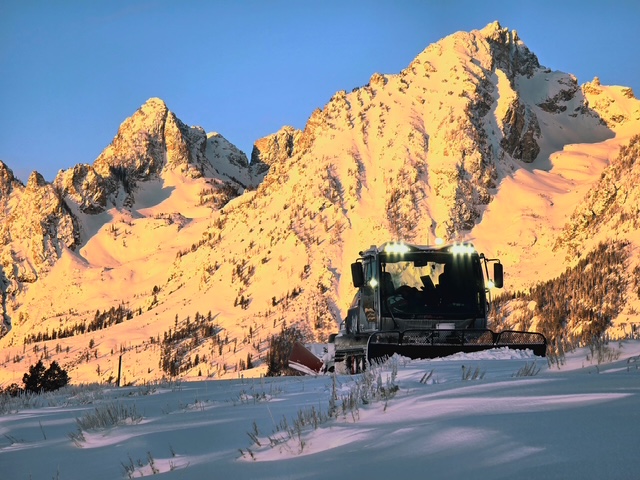Jessi -JH Nordic: I would love to hear about your own personal history, how you got interested in Nordic skiing, how you ended up in Jackson, becoming instructors, your story?
Gwenn: So Don and I came here and taught at the high school a couple years, in ’79. It was really primitive education at that time and we came from big high schools in southern California–Don’s a football coach, I’m a volleyball coach. It was when the high school was actually in town and was very small. I mean they were just so anti-physical education. We were trying to teach all kinds of cardio things and we’d jog ‘em out on the Elk Refuge–all kinds of things like that. It was just beating our heads against the wall because when they built the new high school, they wouldn’t put lines on the gym floor for volleyball or badminton or anything like that.
[Next] we ran the Sport Club at the Aspens when that whole big building was all part of it, with a swimming pool, a racquet ball court, and tennis courts; we had everything, a beautiful weight room, everything.
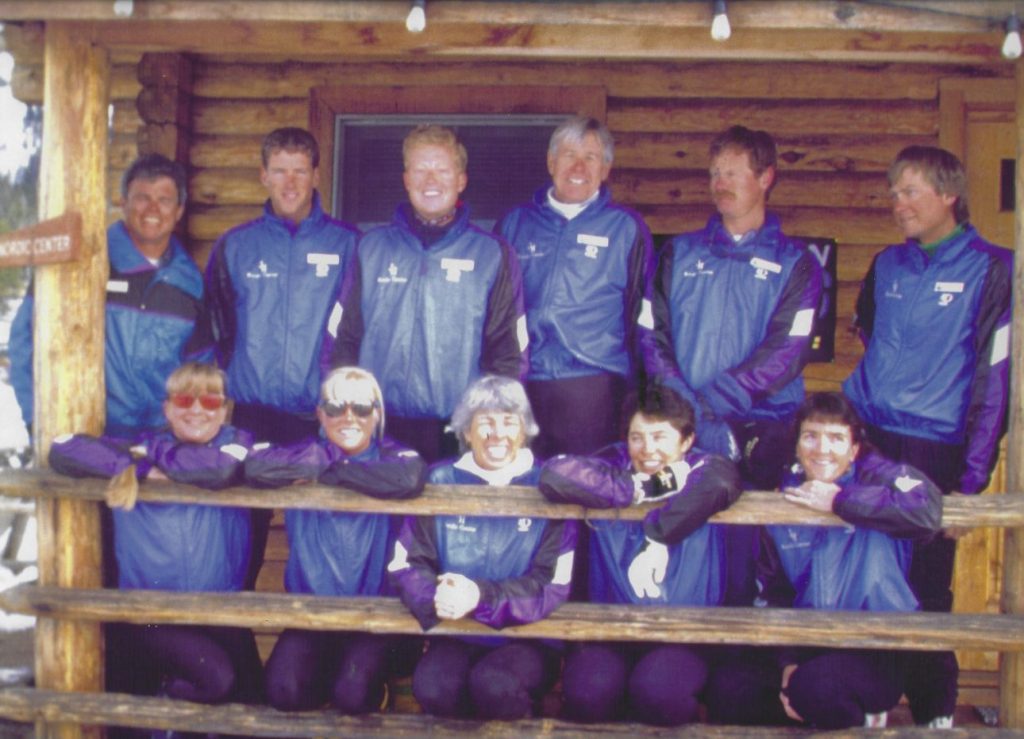
I started teaching skiing at the regular Jackson Hole Ski School, and taught for about 7 years. Don had a friend at the Jackson Hole Nordic Center and started teaching Nordic in 1990. From 1990 to when they closed the Nordic Center down (circa 2015), we worked there. We taught classic, skate, tele, the whole 9 yards and it was incredible. It was just a beautiful experience. We had a friend, Tom Milligan, who was part of the rescue rangers in Grand Teton for a hundred years. He just said, “well let’s go ski up in the park sometime” so we started [Nordic] skiing in the park. One spring, we went on crust, skated, and just fell in love with it. We’ve literally skated in the mornings, say like 6:30am, just when it’s starting to get light, from the far end of Jackson Lake to the Nordic Center – Lizard Creek to the Nordic Center, which must be like 40 miles across all the lakes. We did trips just all over the backcountry. Different people started going out on these trips with us in the spring, like Robin Fulwiler McGee, who worked with us at the Nordic Center, and Tom’s daughter, Kelly Milligan, former Olympian. Nordic just introduced everybody in the valley to this thing; oh, that’s when skating was coming in too and getting really big. Basically, that’s what our history is here.
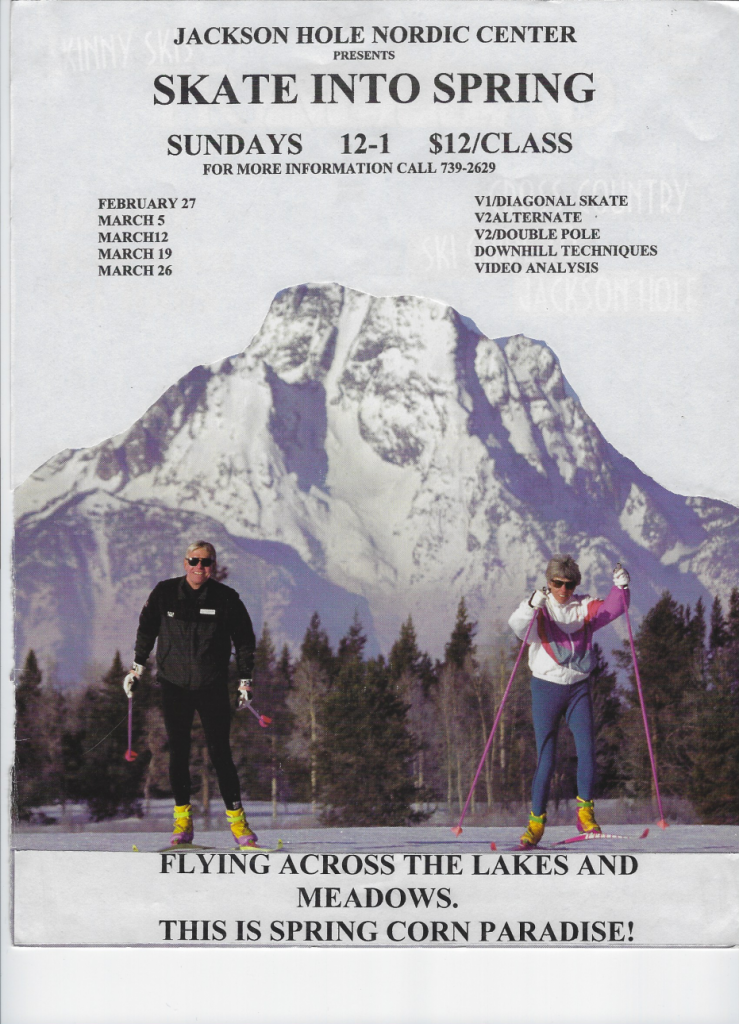
Falling into Skate Skiing in Jackson Hole
J: Did you get interested in skiing once you were already in Jackson?
G: Yeah, for sure Nordic. We did the ‘clunk and glide’ cross country classic in the 80s when Bill Koch was the big guy. That’s right when skate skiing started. It really got popular then. And boy we just fell right into it because it’s just so much fun. And we just skied with people who were better skiers and learned and then became teachers. It was great. I mean skate skiing here is awesome.
Don: For me, I was a 240-pound football player, and I jogged a little bit, then I found cross country skiing. I raced a couple of times, but never was big. Skating kind of saved my life because I was skating all the time–low impact, great cardio, and I lost 40 pounds. I went from 240/230 to 180 pounds just because I started skating. And every spring, you’d be so excited because you get to skate all these meadows. We skated from Signal Mountain across Jackson Lake down to Leigh Lake, skied all of Leigh Lake, ski String Lake, and ski Jenny Lake all in one trip and end up at the parking lot at Taggart-Bradley–you’d take two cars. And we did that frequently. Tom Milligan took us, as we didn’t know these paths, didn’t know how to get there or not get there, and just learned all this stuff.
Skating West Yellowstone to Old Faithful
D: At the Nordic Center, people were really great skiers, I mean really good. We had a group of 6 people [from the Nordic Center], skied from West Yellowstone to Old Faithful, spent the night at the Snow Lodge at Old Faithful and skied out the next morning. It was 32 miles each way, so you had to get up really early in the morning, ski in, spend the night and ski out. You think about that, that was the most exciting thing I’ve ever done.
G: It’s funny! You have to do it real early, before all the ‘bilers come out, but it’s great.
D: You can skate every place, but you have to get off the snow, depending on the weather, by 10:30 or 11 because it goes from great corn snow to crud in about 2 minutes. If you get caught, you’re caught. You always go early, and you’ve got some hard, bad snow, but then you get that great snow right before it turns to mush. It’s probably the best sport I’ve ever done besides surfing.
G: Skate skiing feels like a 10-mile run on the beach. It’s just so beautiful when you’re out there. And skate skiing of course is a lot faster than I ever did any runs on the beach…
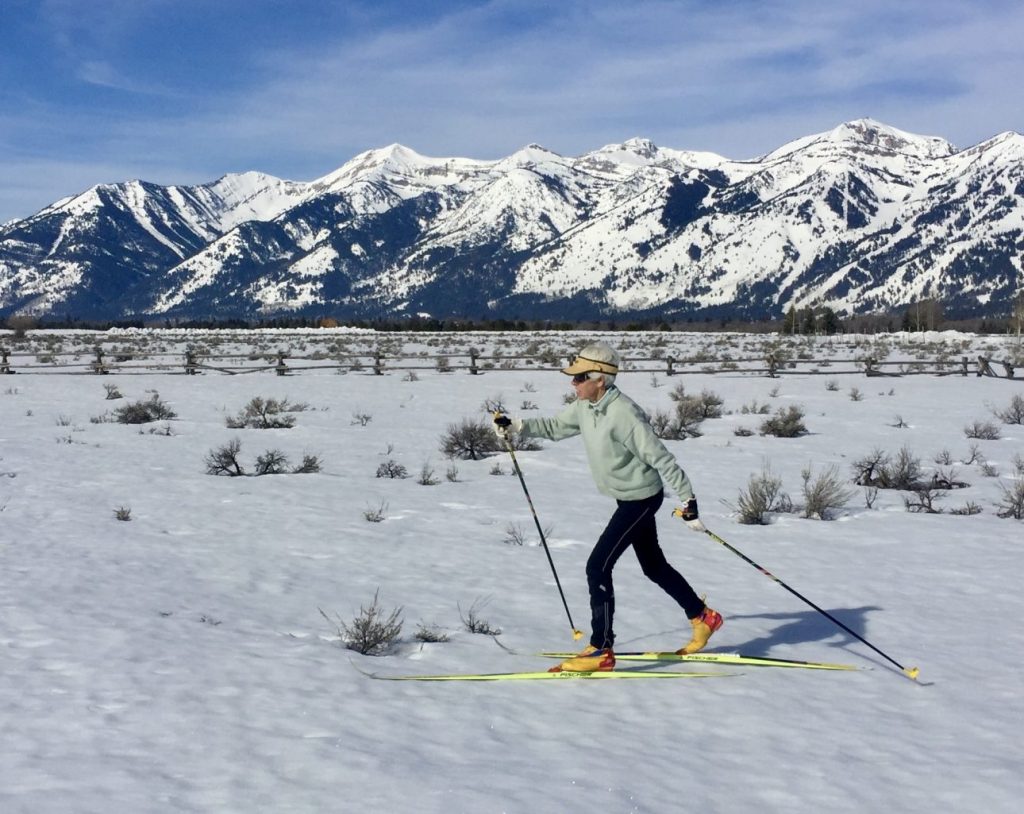
G: [Talking about where I ski…] The different places that we thought of dropping out, when we thought about dropping out—Telluride. We bought some property in Telluride, we went to Snowbird a lot, and spent two years in Mammoth -then when we found Jackson Hole. The tram had been closed for two, three days, and it was the first morning it opened. We got on the tram, and we went to the top and some guys were screaming, ‘the Hobacks are open, the Hobacks are open.’ So we followed this group of guys down the Hoback, got to the bottom, and we moved here.
D: That was our first run in Jackson, and Jackson was pretty tiny in those days. It was just great mountains. The rub on Jackson in those days was that it was great terrain, not well marked and no restaurants on the hill. You had a tent on Casper, you could get a bowl of soup or chili or something, the hot chocolate.
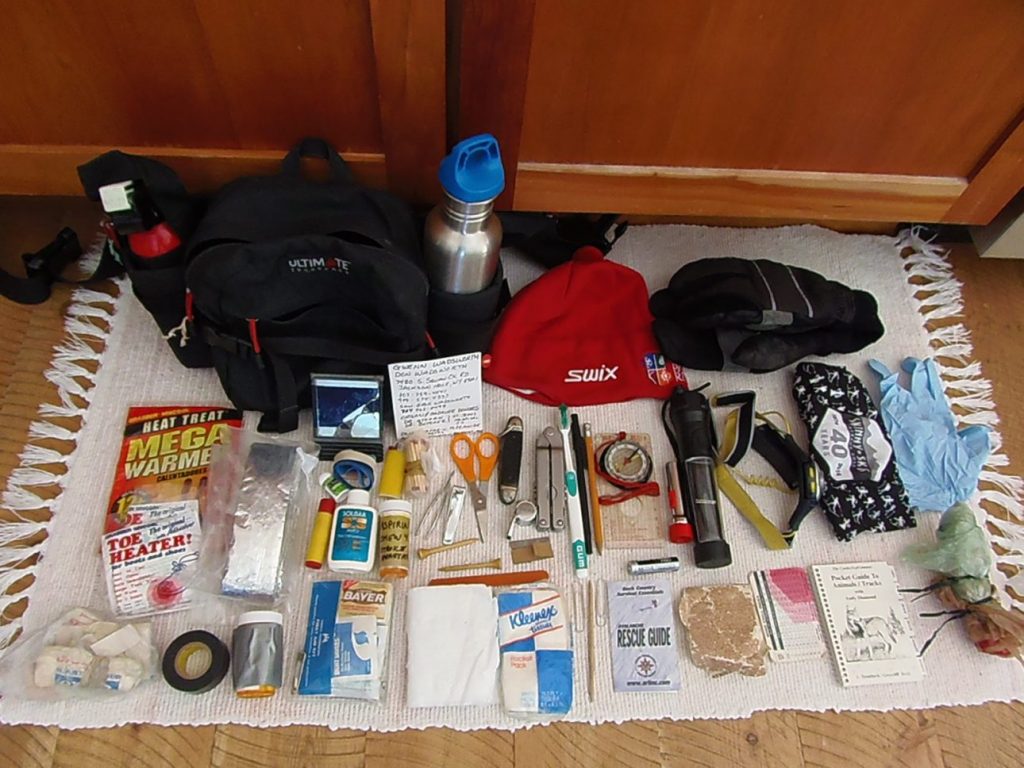
D: One of the things [ I remember] about the Nordic Center, was Kim Springer. Kim still races. Those kinds of people are embedded in your life. I remember she was teaching lessons, and Kim was 8 months pregnant. We’d have a class and here would come this pregnant woman just flying by, great skier, and people always staring at her because she had tights on and she’s pregnant. Kim still skis, all those people still ski, they’re still around, and, oh gosh, the people who taught us, the great cross-country skier, Sean O’Malley. All those guys that are old timers that are here and you don’t even think about them. Some of them are Olympians, made the Olympic team, Kelly Milligan; there really is a sub culture of people who in the springtime would skate all these meadows. And would skate miles and miles and were great athletes.
I’m 87, so we reminisce about skiing in the olden days, starting in the ‘60s at Mammoth, California. We always go back to cross country skating as our fondest memories of skiing. They’re not from the downhill skiing, even though that’s really important; it’s some of the skates we’ve had across lakes and meadows, going to the Potholes [in GTNP], the elk running out of the Potholes, you remember stuff like that above almost anything you’ve ever done in Jackson– that’s what I think about. It’s just been fun.
Skate Skiing for an Active, Healthy Life
J: What do you attribute your lasting health and athleticism to?
D: For me, I’m a jock. I was raised in a locker room. My habits were horrible. I ate too much… And so I met my sweet wife who…
G: Don was playing football at San Jose State College, he was a scholarship guy years, years, years ago.
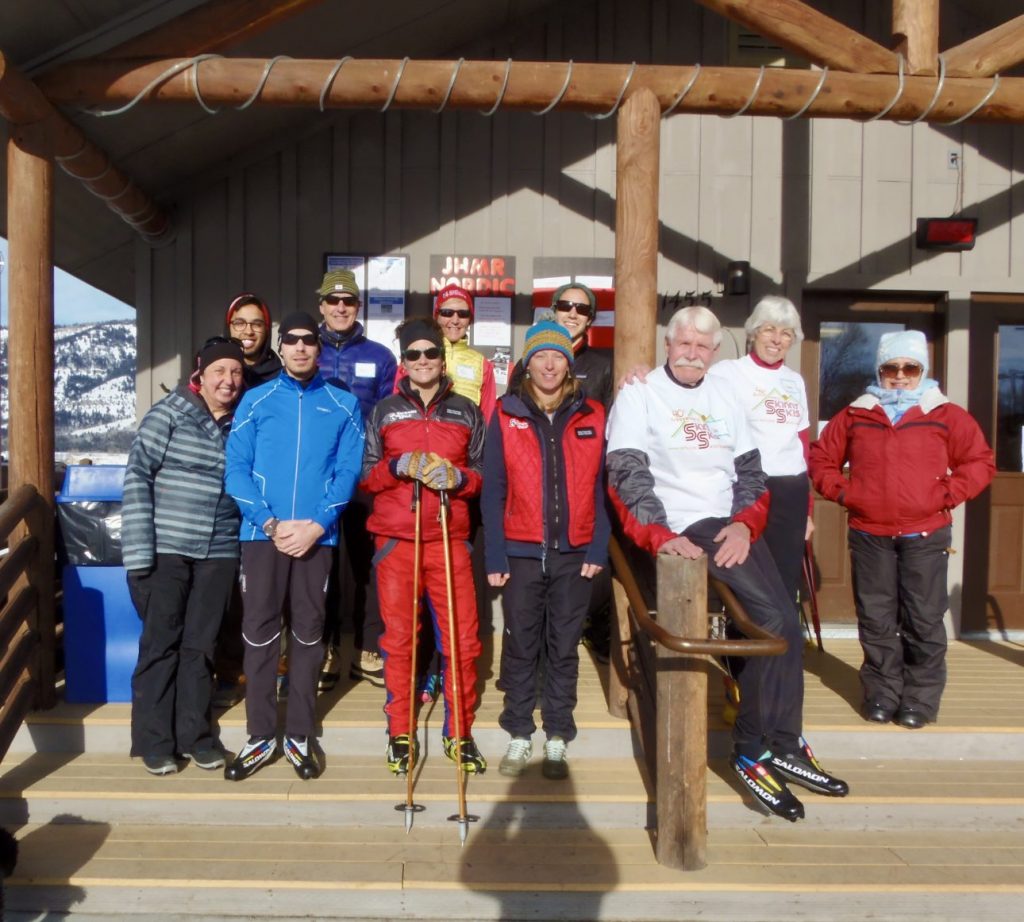
D: So, I met Gwenn and I became a vegetarian. I can’t imagine me being a vegetarian, but my wife says, ‘oh I want to be a vegetarian’. This is maybe 40 years ago, so I said ‘ok, well I’m not gonna,’ she said ‘ok but you have to be responsible for your own cooking.’ I lasted as a meat eater for maybe two more weeks, and I said I’m not gonna do this. So, I became a really healthy eater, a skate skier. I love exercise, I ride my bike. In the springtime, you just think about skating, so everything you wanted to do, all I wanted to do after a while was I wanted to ski, I wanted to surf, and I played doubles volleyball. You don’t have to be 240 pounds to do those activities, you want to be smaller. It just started dominating my life, so you start steering your life that way.
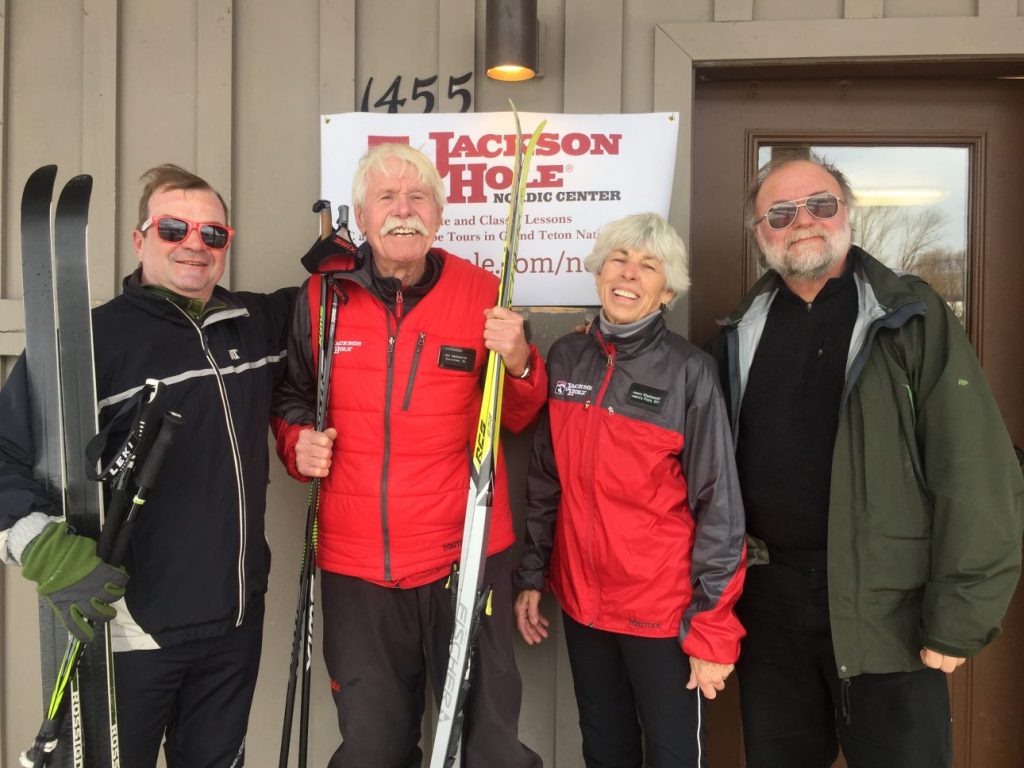
G: By the time we were teaching, it really hit the fan in the country that exercise is important, eating right was important. If you wanted to have a long life, you needed to be disciplined. We were in that era, it caught hold, and it was magic for us; [Sadly], we don’t have any old friends that are alive hardly. All of our friends here are pretty young and still alive. And a lot of that has to do with just giving up junk food. There’s a difference between being big-o and fat-o. What people need to be aware of is their body fat content, and what are the consequences. That same idea, eating well, taking care of your body, healthy exercise. It’s just a better-quality life, period. That’s it.
D: For me, I was still surfing up into my 80s, but the last 6 or 7 years, I’ve had two back surgeries, and I don’t think I’m going to ski or surf anymore or very much. I’m just not going to do it anymore, but I do enjoy life and I do want to live a little longer. With one of my famous doctors here in Jackson, I was complaining about my body falling apart. So being a male, with the problems I’m having, he says, ‘well Don if you’d died on time, you’re supposed to die at 78,’ I wouldn’t be wearing out. He’s a great guy, I was just joking of course, but you know your things change. I’m not gonna do the same stuff.
Like we used to have the telemark races on Casper [JHMR]. So, you’re racing, and they’d say ‘Don, how’d you do?’ and I say ‘well, I won my division,’ they say ‘you won your division?’ I never was last, but I was very far from the front. They say ‘what’s your division?’ I’d say ‘over 65, born in east LA.’ ‘It’s a small crowd’ ‘Yeah there’s very few of us, but I won.’ It just shows how the whole emphasis changes. Being a competitive guy, you just want to play.
Play to the End
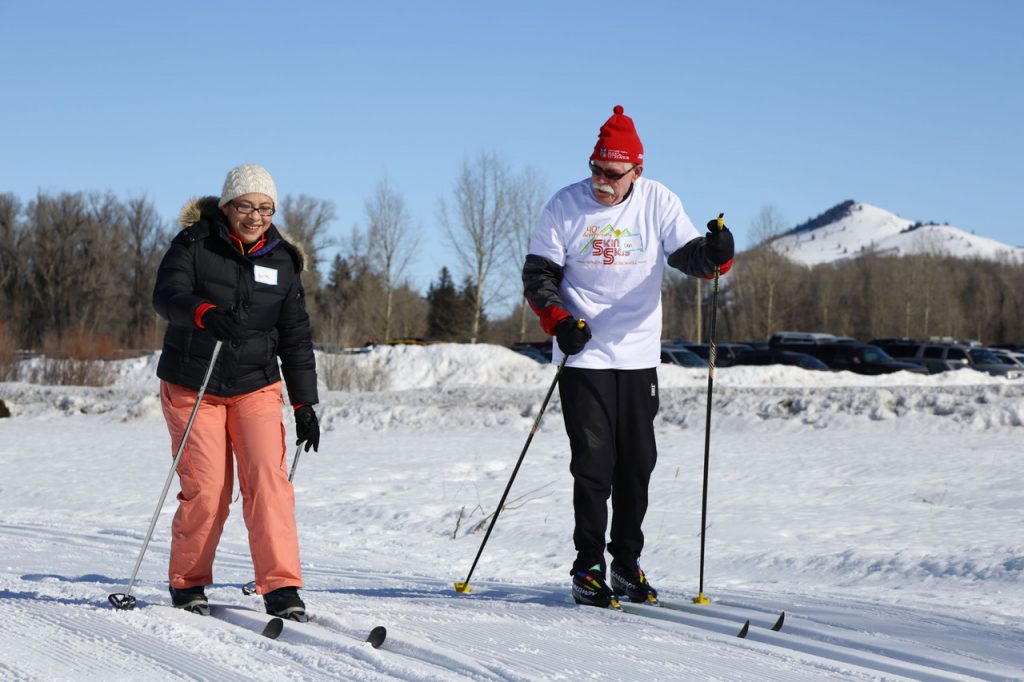
You look at it as when people ask you ‘oh, your body aches, how come you’re….?’ We’re not unique, everybody in Jackson has achy bodies, but you try to explain to someone, they don’t understand there’s intrinsic value in play. They say ‘well why do you want to surf,’ I say ‘well have you ever caught a wave?’ ‘No,’ ‘well, then I can’t explain it to you.’ And not just because you’re any good at it, it’s just that you enjoy doing what you’re doing, you enjoy skiing… but after a while, people have to wait for you. It makes you feel bad. You stop skiing with them because they have to wait for you, but you can’t stop the activity, you just do it at a different level. And when you’re skiing across Jackson Lake and the sun is coming up, there’s nothing like that, and if you happen to enjoy it with your girlfriend, it makes it even more special because you’re doing it–you’re not doing it really well, but you’re doing it, and that’s what you do. If you can’ ski, you do something else–if you can’t run you walk, if you can’t walk… You know your life is different when… Gwenn and I have been together 54 years.
G: Yeah, our motto is ‘play to the end’. Sort of like when you can’t run, you jog, and when you can’t jog, you walk, and when you can’t walk, you push your walker.
